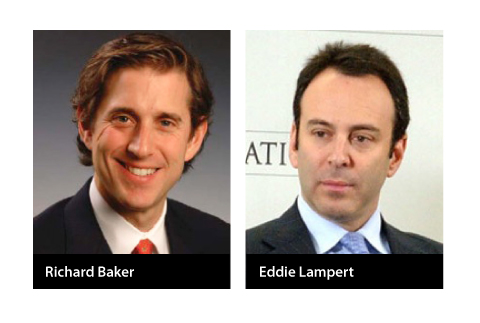Now that Eddie “sell the assets” Lampert is turning his dying retail business into a real estate play, he should retain Richard Baker as a consultant. If Lampert can afford him. Of course Richard doesn’t need the money, so he might do it out of the goodness of his heart. After all, ‘tis the season. While nobody ever questioned Eddie’s financial engineering skills, he is now at the 11th hour before bankruptcy or outright liquidation of the Kmart and Sears’ businesses. The only asset he has left to squeeze more cash out of is the real estate. With that in mind, Baker’s brilliance in real estate would come in handy. Here’s his story. In Canada, Baker sells the Zeller’s chain for a huge premium of $1.8B to Target. This is akin to Target getting whacked in the head with a sandbag. More recently Baker gets an appraisal on Saks 5th Avenue for a whopping $3.7B, making it the most valuable retail building in the world. Just to give some context, it was reported to be worth between $1B and $2B when he bought it a couple years ago.
GEEEZ!!! This guy is something else. It reminds me, as I will now remind you, about the first article I wrote about Richard’s acquisition of Saks Inc. and L&T. I placed the very same side-by-side headshots of Eddie and Richard at the top of the article, as I have done so again. The gist of that piece was about Lampert’s public bluster that he was going to return Sears and Kmart to their once iconic positions as great American brands — this without an iota of retail experience. I also raised the question and a similar issue about Richard Baker appointing himself CEO of not two, but three huge retail brands (with not an iota of retail experience). Not that the HBC triumvirate is anywhere near as big as the Sears Holdings combo, but they are nevertheless three discrete brands. I opined in the article that Richard should not have appointed himself CEO because the high-caliber executives that he would need to re-energize and grow Saks and L&T would be put off by having to report to someone with limited experience in retailing.
On the other hand, while Eddie didn’t immediately appoint himself CEO upon forming Sears Holdings, he acted as CEO, churning through several by-title-only CEOs who were arguably driven off by Eddie’s micromanagement tendency. Lampert finally succumbed to this reality and officially appointed himself CEO. Since then, as the numbers validate, the Kmart and Sears businesses continue, if not accelerate, downward.
Keep these thoughts in mind. I will loop back to them to make a point of what might have been Lampert’s and Baker’s real strategies from the beginning, and neither had anything to do with the business of retailing. But before I do, I must comment on Baker’s most recent move and raise some other issues that may explain his endgame.
Enter Gerald “Jerry” Storch
HBC recently announced the hiring of Jerry Storch, to be the new CEO overseeing the combined businesses: Hudson’s Bay; Lord & Taylor; Saks Fifth Avenue; Saks Off 5th; Home Outfitters and HBC Digital. The current heads of those businesses will now report to Storch. Storch, in turn, will report to Baker as governor and executive chairman of HBC. Baker and Storch together will comprise the office of the chairman.
Unlike Baker, Storch has considerable experience in the retail sector: beginning at the May Department Stores Co.; later as vice chairman at Target; and more recently, as Chairman and CEO of Toys ‘R’ Us. Early in his career he was a principal at McKinsey & Co.
Baker told WWD that, “having Jerry as the CEO gives me some additional time to focus on the three core activities that I generally like to focus on – the international opportunity, our real estate opportunities, and potential mergers and acquisitions.” He went on to say, “I still will be involved in participating and understanding the operations of our existing businesses and how we invest our capital. Jerry and I will be partners in all endeavors of the Hudson’s Bay Co.”
The Questions and Issues
I am eager to say Richard’s hiring of Storch was a very smart thing to do, and would like to say he’s smarter than Eddie by hiring a seasoned veteran and former CEO in retailing. Even though Eddie tried one CEO after another, he gave into his own hubris. But several questions hang over the Storch decision. Storch’s management and C-level experience was always over a single retail entity. So regardless of how effective a leader he might have been, does he have the bandwidth to oversee three large, complex and distinctly different retail brands, one of them in Canada where Storch has had little experience? Number two: How will the heads of Saks Fifth Avenue (Marigay McKee), Saks Off 5th (Jonathan Greller), and L&T (Liz Rodbell) adjust to reporting to Storch? Not so incidentally, and not without some mystery of its own, Don Watros, who preceded Storch as president of the combined businesses, and to whom those heads used to report, was appointed president of the group’s new international unit created to identify and launch international businesses, a space in which Baker will apparently spend more time now that Storch is at the helm of the retail operations.
Bigger questions and issues can be tossed around regarding how the relationship between Baker and Storch will play out. Baker and Storch “comprising the office of the chairman,” is not the same as co-chairing the office. And the WWD article was clear on the fact that Storch would be reporting to Baker. So the biggest question here, as I raised in my previous article about the potential similarities between Richard and Eddie, does Richard have the same micromanagement style? If so, will Storch’s ego be able to handle it? Will this be the beginning of a Lampert-style revolving door, churning through numerous CEO’s? Like Eddie, if Baker goes through enough CEOs, will he look in the mirror and say to himself, “Richard, you are the only guy who can run this business,” thus re-appointing himself CEO?
Will the Real Richard and Eddie Please Stand Up
Now I suggest you simply view all of the aforementioned points about Baker’s recent moves as a sideshow. As I have credited Richard Baker as a brilliant real estate mogul and Eddie Lampert a brilliant financier, why do we think they would purposely side-step their chosen professions, both having been enormously successful so far, to launch into a career in retailing. The answer is that, in fact, they are not. “A little bird” told me that Eddie’s formation of Sears Holdings from the outset was a pure play financial strategy, to “unlock value” (cash), and not for turning around the two icons as retail businesses (as he publicly proclaimed was his intention). Through brilliant “financial engineering,” his intention was to keep cash flowing into his pockets even as the two “Titanics” were sinking.
So is brilliant real estate mogul Richard Baker’s real strategy simply a real estate play, as many believed it was when he acquired Saks Inc. and L&T? Or is his real strategy to re-energize and grow the retail businesses as he publicly proclaims?
What if Richard Baker is implementing both? If so, and he’s successful, I guess that makes him way smarter than Eddie.




